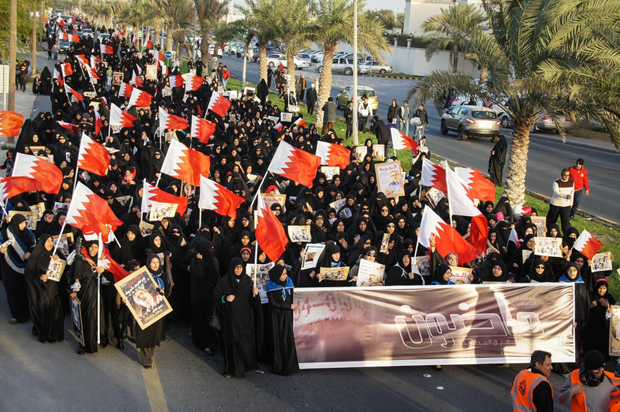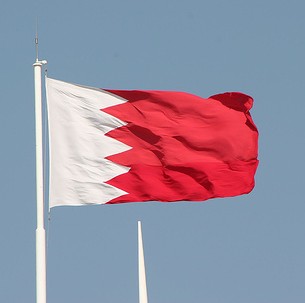Index relies entirely on the support of donors and readers to do its work.
Help us keep amplifying censored voices today.

A pro-democracy protest in January 2013. (Photo: Moh’d Saeed / Demotix)
On 17 September, Bahraini authorities arrested Khalil Marzouq, a prominent member of the opposition Al Wefaq group. Following an interrogation that lasted over seven hours, he was charged under newly amended terrorism laws leading, to Bahrain’s main opposition party to pull out of the National Dialogue.
The credibility of the dialogue itself has come under criticism, as the government has carried on with its crackdown on dissent throughout the discussions. Amnesty International points to this irony by noting that authorities have been “flaunting” the National Dialogue as the central reason for canceling the visit of UN Special Rapporteur on Torture back in April, yet have nevertheless moved towards arresting participants. The actions have been criticised as measures intended to “wipe out the opposition”.
There has also been an attempt to dismember the Ulama Council of Shia religious leaders, led by Sheik Isa Qassim. Additionally, in a recent development, Bahrain’s Public Prosecutor has also been re-elected as a member Member of International Association of Prosecutors Executive Committee, despite Bahrain’s human rights abuses and continued prosecution of human rights defenders and political activists.
The results have been critical; Bahrain has been leading a campaign of repression with impunity since the protests began.
The recommendations of the Bahrain Independent Commission of Inquiry and the United Nations Universal Periodic Review have been largely ignored in practice, and instead practical moves have been taken within the national legal framework to target the opposition.
New terrorism laws have been announced implementing measures to withdraw citizenship and setting tough penalties against anyone that the regime dubs a terrorist. Newly implemented decrees have also imposed sweeping bans on all forms of peaceful protest in the capital Manama, alongside tough penalties for parents and guardians of juveniles who take part in unlicensed demonstrations.
Such measures have always been imposed in Bahrain, however the move to practically implement them within national law has lead to a new era of political polarisation.
Media personnel and citizen journalists reporting on human rights abuses have also found themselves targetted. In August, citizen journalist Mohamed Hassan was arrested and his equipment seized during a midnight raid on his home. Shortly following the events, his lawyer AbdulAziz Mosa was also detained after tweeting claims that Hassan had been tortured. The Bahrain Centre for Human Rights reported that he had been interrogated for over three hours, beaten on his back and lower abdomen and “forced to confess under mental and physical coercion”.
More recently, on the 24 September, a US citizen Tagi Al Maidan was convicted and sentenced under charges relating to attempted murder: charges he consistently denies. Al Maidan has long complained of torture during his detention. Torture was confirmed to have been a systematic practice in Bahrain by the BICI despite the government’s denial that it takes place.
Allegations of torture and ill-treatment continue to surface following the report, not only in places of isolation away from security departments, but during CID and Public Prosecution interrogations. During a meeting between Bahrain’s Prime Minister and Mubarak Bin Huwail, recently acquitted of torture, the PM commented to Huawail that “these laws cannot be applied to you. No one can touch this bond. Whoever applies these laws against you is applying them against us. We are one body”.
Despite the lack of international accountability for Bahrain’s rights abuses, these recent developments have forced some states to show public concern over the future of the Kingdom. At the 24th session of the UN Human Rights Council, 47 states expressed concern through a joint-statement over the deterioration of the human rights situation in Bahrain, its newly implemented terrorism laws (specifically revocations of citizenship), the increase in violence and the imprisonment and harassment of persons exercising their internationally recognised freedoms.
The European Parliament has similarly expressed concerns over the deteriorating situation where “human rights activists are facing ongoing systematic targeting, harassment and detention in Bahrain”.
The uprising looks to continue amidst the absolute subjugation of any form of dissent. Opposition have been branded and targeted as “terrorists” — a term undefined in Bahrain national law — and as anniversaries are set to be re-lived in the new year, the movement is subsequently set to escalate in dissent.
This article was originally posted on 26 Sept 2013 at indexoncensorship.org
 Activists are accused of belonging to a secret network, but the court has failed to prove its existence or even its name, says Saeed al-Shehabi, exiled in the UK and sentenced in absentia
Activists are accused of belonging to a secret network, but the court has failed to prove its existence or even its name, says Saeed al-Shehabi, exiled in the UK and sentenced in absentia
Freedom of expression has been dealt heavy blows in recent months by the government of Bahrain. A military court in Manama has this week issued heavy sentences against several people for openly expressing political views.
Eight were sentenced to life imprisonment, all of whom have been punished for their views and are considered “Prisoners of Conscience”. Although they were accused of belonging to a secret network, the court has failed to prove its existence or even its name.
Among those is Dr Abdul Jalil Al Singace, a blogger and an open critic of the regime. He was first arrested on 8 August 2010 upon his return from UK after he criticised the government at a House of Lords seminar three days earlier.
He was severely tortured in his six months incarceration, blindfolded, deprived of his glasses and crutches (he is severely disabled as a result of polio since his birth), hanged from hands and knees, subjected to electric shocks with what appears to be Taser machine and deprivation of sleep. His two sons were also arrested as means of pressure.
Dr Saeed Shehabi, a UK citizen, who has also received a life sentence in absentia is a journalist with a weekly column at Al Quds Al Arabi (and Arabic daily published in London) and a former editor of the Arabic weekly (Al Aalam).
Ali Abdul Emam, the most known blogger in Bahrain, received a 15 years sentence after being tried in absentia. He is the founder of Bahrainonline.org, the largest and most popular website in Bahrain. He had been arrested last summer together with more than 500 Bahrainis in a government crackdown against the opposition.
Two weeks ago, Ayat Al Qurmuzi, a 20 year old poet was jailed for one year for reciting a poem in February at Pearl Square.
The attack on freedom of expression has claimed many other victims. Among them is Dr Mansoor Al Jamri, the editor of the semi-independent daily newspaper, Al Wasat, who is on trial with other staff members for publishing news unfavourable to the government.
While most of the victims have been Shia Muslims, at least one Sunni Bahraini has been punished for expressing his views; Mohammad Bu Flasa disappeared on 17 February shortly after addressing the crowds at Pearl Square. He is still languishing in jail.
Image: The Sniper on Flickr.